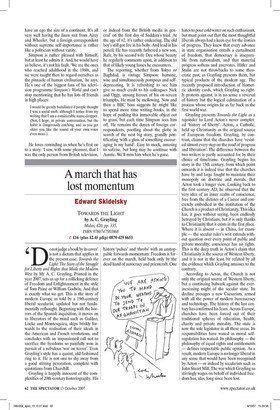A march that has lost momentum
Edward Skidelsky TOWARDS THE LIGHT by A. C. Grayling Midas, £20, pp. 335, ISBN 9780747583868 £16 (plus £2.45 p&p) 0870 429 6655 D , not judge a book by its cover' is not a dictum that applies in the present case. Towards the Light: The Story of the Struggle for Liberty and Rights that Made the Modern West by Mr A. C. Grayling, Printed in the year 2007, sets us up for a rollicking defence of Freedom and Enlightenment in the style of Tom Paine or William Godwin. And that is exactly what we get. This is the story of modern Europe as told by a 19th-century liberal secularist, updated but not fundamentally rethought. Beginning with the horrors of the Spanish inquisition, it moves on to liberators of the mind such as Galileo, Locke and Montesquieu, skips briskly forwards to the realisation of their ideals in the American and French revolutions, and concludes with an impassioned call not to sacrifice the freedoms so painfully won in pursuit of a nebulous 'war on terror'. Even Grayling's style has a quaint, old-fashioned ring to it. He is not one to shy away from a good stirring peroration, complete with quotations from Churchill.
Grayling is happily innocent of the complexities of 20th-century historiography. His history 'pulses' and 'throbs' with an unstoppable forwards momentum. Freedom is forever on the march, held back only by the dead hand of autocracy and priestcraft. One hates to pour cold water on such enthusiasm, but must point out that the most thoughtful liberals always had a keen eye for the ironies of progress. They knew that every advance in state organisation entails a curtailment of freedom, that democracy is inseparable from nationalism, and that material progress softens and enervates. Hitler and Stalin are not throwbacks to some theocratic past, as Grayling presents them, but typical products of the modern age. The recently proposed introduction of biometric identity cards, which Grayling so rightly protests against, is in no sense a reversal of history but the logical culmination of a process whose origins lie as far back as the first world war.
Grayling presents Towards the Light as a rejoinder to Lord Acton's never completed 'history of liberty'. Acton, a Catholic, held up Christianity as the original source of European freedom. Grayling, by contrast, claims that the churches have 'resisted almost every step on the road of progress and liberation'. The difference between the two writers is partly accounted for by their choice of timeframe. Grayling begins his story in the 15th century, from which point onwards it is indeed true that the churches have by and large fought to maintain their monopoly on doctrine and morals. But Acton took a longer view. Looking back to the first century AD, he observed that the very idea of an inner realm of conscience, free from the dictates of a Caesar and concretely embodied in the institution of the Church is a product of Christianity. This idea has, it goes without saying, been endlessly betrayed by Christians, but it is only thanks to Christianity that it exists in the first place. Where it is absent — in China, for example — the secular ruler's writ extends without question over every point of public and private morality; conscience has no rights. This is the deep truth in Acton's claim that Christianity is the source of Western liberty, and it is not in the least bit refuted by all the evidence which Grayling amasses to the contrary.
According to Acton, the Church is not only the original source of Western liberty, but a continuing bulwark against the everincreasing might of the secular state. Its decline presages a new Caesarism, armed with all the power of modern bureaucracy and technology. The history of the last century has confirmed his fears. Across Europe, churches have been forced out of their traditional spheres of education, health, charity and private morality. The state is now the sole legislator in all these areas. Its responsibilities have waxed as moral selfregulation has waned. Its philosophy — the philosophy of equal rights and entitlements — defines respectable public opinion. As a result, modern Europe is no longer liberal in any sense that would have been recognised by Acton — or indeed by secularists such as John Stuart Mill. The war which Grayling so stirringly wages on behalf of individual freedom has, alas, long since been lost.



































































 Previous page
Previous page